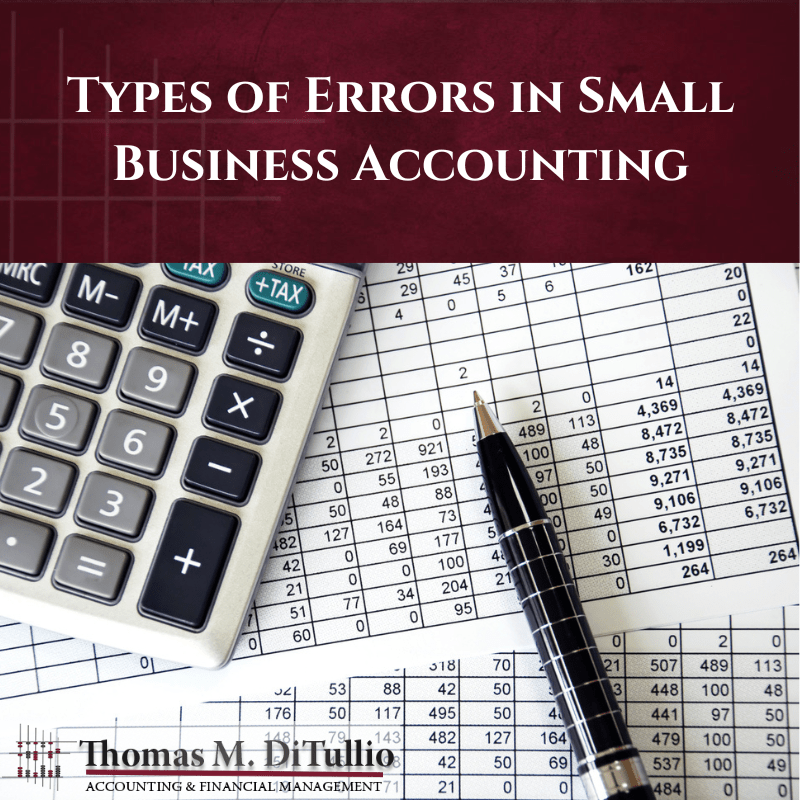Types of Errors in Small Business Accounting
When you have a small business, you do not want to make any type of accounting errors. These errors could throw off your books and lead to penalties from the IRS. If there are errors, it is crucial to spot and correct them. Here are some of the types of errors found in small business accounting.
Error of Duplication
Sometimes, you may have recorded a debit or credit twice in the books. Many of these errors are made when several people handle the bookkeeping duties. Also, when more than one invoice is sent to your business, you may put a double entry in the books. While many duplicate entries are minor, those significant amounts can seriously impact your business, leading you to understate or overstate your income.
Error of Omission
On the other hand, if you fail to enter a financial transaction in the books, that is known as an error of omission. These errors can overstate or understate your income and affect the balance sheet. For those errors of omission in the accounting process, it can significantly impact the trial balance, which is the report for the accounts in the general ledger. Anytime you misplace an invoice or receipt, it can lead to those errors of omission in your accounting books.
Error of Original Entry
This type of error means that someone entered incorrect information into the books. A receipt or invoice should back up all entries. In this case, an individual made the original entry, but the bookkeeper may have transposed the numbers. Like other errors, this one can have a significant impact on the books.
Error of Commission
In some cases, the numbers do not make it to the right place. Errors of commission occur when the item is entered in the wrong spot. For example, you could post the items to the accounts receivable account rather than the account payable, or someone had applied a customer’s payment to another invoice. These errors can affect the balance sheet and income statement.
Compensating Error
In some situations, one account error is balanced out by an error in another account. For example, an incorrect entry in the inventory and a corresponding error in the account payables may cancel each other. These errors do not affect the trial balance since they are both opposite and equal, but they are still errors in your books.
Error of Principle
When an accounting error is made on both sides of the transaction, that is known as an error of principle. Often, these errors happen when the individual recording the transaction does not grasp the basic accounting principles. For example, a fixed asset purchase is entered as an operating expense. These errors will not affect the trial balance. One way to correct these issues is by hiring a professional to handle your books.
Error of Entry Reversal
You may find those reversing entries at the end of the accounting period. In some cases, a credit will be posted as debit, or an invoice is listed in the accounts payable instead of accounts receivable.
Preventing Business Accounting Errors
You can prevent those accounting errors with a few tips. First, you always want to have someone capable of understanding accounting and bookkeeping in charge of the entries. They should be accurate with their typing. In many cases, transposing numbers can throw off an entire ledger. Your would-be bookkeeper needs to understand those financial statements and know where to enter the entries.
While it may be tempting to handle the bookkeeping and accounting yourself, hiring a professional team can make life easier for everyone. An experienced firm understands the basics of the bookkeeping and accounting world. By using professional services, you can ensure there will be no entry mistakes in those books. You can save money using a friend or family member, but an experienced and reputable accountant must adhere to specific guidelines to produce accurate reports for your small business. Get some peace of mind and hire a professional for the job.
When you hire a professional bookkeeper, they will compare bank accounts to the accounting ledger. With that, they will correct any errors before those mistakes lead to big problems. Bookkeepers will also help you stay on track. Hire those small business accounting services for the job. They will track all your financial transactions, whether big or small.
Errors Can Be Costly
As a small business, you need to understand your costs. All businesses need to know whether they are operating at a loss or profit. With those mistakes, you could underestimate or overestimate your costs, leading to financial problems down the road. One error can cause many headaches for your business, making it a nightmare to straighten out. Plus, you can even face penalties from the IRS if that mistake leads to filing incorrect taxes.
While mistakes can happen, and no one is perfect, you need accuracy with your financial statements, balance sheets, and the rest of your books. Hiring a reputable and experienced bookkeeping and accounting firm can help you avoid those mistakes.
When you need a South Jersey accountant for my small business, reach out to TMD Accounting. We are a family-owned and -operated business that has been serving the community of Gloucester County for over 40 years. Our team has helped many small businesses in the area. We are your flexible, reliable, and affordable choice when you need accounting, bookkeeping, and tax services in the area. Schedule your consultation by calling 856-228-2205.

